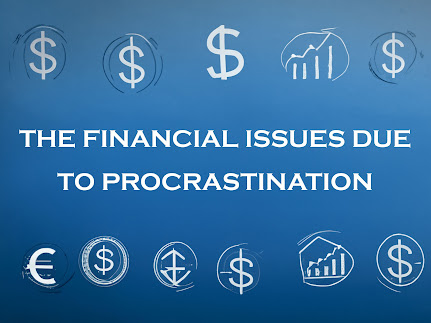Procrastination
Causes, Impacts, and Overcome It.
Procrastination, frequently alluded to as the "specialty of postponing," is a typical way of behaving that most people insight sooner or later in their lives. While it could appear to be innocuous temporarily, procrastination can fundamentally affect efficiency, mental prosperity, and, surprisingly, long haul objectives. In this article, we dig into the circumstances and end results of procrastination and investigate methodologies to conquer it.
The Idea of Procrastination
Procrastination is the demonstration of deferring assignments or exercises that require prompt consideration, frequently for less significant or more pleasant exercises. It's critical to take note of that procrastination isn't just unfortunate using time productively; it's a perplexing way of behaving impacted by mental, profound, and mental elements.
Reasons for Procrastination
Understanding the roots of procrastination can assist people with tending to the way of behaving successfully. A few normal causes include:
1. Absence of Inspiration and Interest
Tasks that lack clear meaning or are perceived as uninteresting can lead to procrastination. When a task doesn't align with personal goals or values, the motivation to start or complete it diminishes.
2. Fear of Failure or Perfectionism
The fear of failing or not meeting high standards can trigger procrastination. Perfectionists often delay tasks because they fear their efforts won't be flawless, leading to a cycle of avoidance.
3. Task Complexity and Overpower
At the point when an undertaking is complicated or seems overpowering, people might postpone beginning it because of the vulnerability of where to start or how to continue.
4. Absence of Design and Arranging
Without a clear plan or structure, tasks can feel ambiguous and intimidating. Procrastination may result from not knowing the steps required to complete a task.
5. Moment Delight
Modern technology and entertainment provide instant gratification, making it easier to choose short-term pleasures over long-term goals, leading to procrastination.
Impacts of Procrastination
Procrastination can have a scope of pessimistic impacts, both in private and expert circles:
1. Expanded Pressure and Nervousness
As deadlines approach and tasks accumulate, the stress of impending work can lead to anxiety and a decreased ability to perform effectively.
2. Lessened Execution
Procrastination can result in rushed or subpar work, leading to lower quality outcomes compared to what could be achieved with ample time and effort.
3. Botched Open doors
Procrastination can cause missed deadlines, leading to missed opportunities for advancement, recognition, or personal growth.
4. Stressed Connections
At the point when procrastination influences cooperative undertakings or responsibilities to other people, it can strain connections and disintegrate trust.
5. Influence on Emotional wellness
Reliably deferring significant errands can add to sensations of responsibility, self-uncertainty, and low confidence, adversely affecting mental prosperity.
Defeating Procrastination
Perceiving and tending to procrastination requires cognizant exertion and the advancement of successful procedures:
1. Put forth Clear Objectives
Lay out unambiguous, quantifiable, feasible, applicable, and time-bound (Shrewd) objectives to give lucidity and inspiration to errands.
2. Separate Assignments
Partition complex assignments into more modest, sensible advances. This approach can cause the general assignment to show up less overwhelming and improve the probability of beginning.
3. Focus on and Plan
Make a plan for the day and focus on undertakings in view of direness and significance. Foster an organized arrangement that frames how you will move toward each undertaking.
4. Limit Interruptions
Distinguish and limit interruptions that add to procrastination. Establish an engaged workplace to upgrade fixation.
5. Practice Self-Empathy
Supplant self-analysis with self-empathy. Comprehend that missteps and flaws are important for the educational experience.
6. Utilize the Two-Minute Rule
In the event that an errand can be finished quickly or less, do it right away. This standard forestalls the aggregation of little assignments that add to procrastination.
7. Practice the Pomodoro Strategy
Utilize the Pomodoro Strategy, which includes working for an engaged period (generally 25 minutes) trailed by a brief break. This technique can increment efficiency and diminish the inclination to delay.
8. Look for Responsibility
Share your objectives and cutoff times with somebody who can consider you responsible. Outer responsibility can inspire you to conquer procrastination.
9. Reward Yourself
Integrate prizes into your daily schedule for getting done with jobs. This uplifting feedback can cause assignments to feel more charming and rouse you to begin sooner.
Beating Procrastination and Molding a Positive Future
To shape a more useful and satisfying future, handling procrastination with successful strategies is critical:
1. Embrace Proactive Preparation
Foster a proactive arranging approach that incorporates defining clear objectives and making organized plans for task culmination. This engages you to assume responsibility for your future errands.
2. Practice Self-control
Develop self-control and foster a propensity for sticking to timetables and cutoff times. Over the long run, this will add to all the more likely using time effectively and improved future efficiency.
3. Develop Ingenuity
Recognize that beating procrastination requires determination. Celebrate little triumphs and remain focused on steady improvement in overseeing undertakings.
4. Center around Long haul Advantages
Shift your concentration from quick satisfaction to long haul benefits. Perceive that by following through with responsibilities speedily, you're putting resources into a more effective and satisfying future.
5. Look for Responsibility
Draw in with responsibility accomplices who can offer help and consolation. Imparting your objectives to others makes a feeling of obligation and lifts future efficiency.
6. Foster Versatility
Take on a strong mentality to balance the anxiety toward disappointment. Embrace errors and difficulties as any open doors for development, upgrading your future abilities.
The Financial Issues due to Procrastination
This is the way procrastination can prompt huge monetary issues:
1. Missed Bill Installments
One of the quickest outcomes of procrastination is missed bill installments. Shoved aside charges or due dates for Visa installments can prompt late expenses, expanded loan costs, and even harm shockingly score.
2. Ignored Reserve funds and Speculations
Deferring commitments to bank accounts, retirement plans, or ventures could appear to be innocuous temporarily, yet over the long run, the botched an open door for compound development can essentially influence your monetary security later on.
3. Poor Financial Preparation
Procrastination frequently brings about poor financial preparation. Inability to make and adhere to a spending plan can prompt overspending, collecting obligation, and without the assets required for crises.
4. Postponed Professional success
Keeping away from proficient improvement amazing open doors because of procrastination can ruin professional success. This, thus, can influence your procuring potential and long-haul monetary steadiness.
5. Overlooked Expense Liabilities
Deferring charge related undertakings, like recording returns or coordinating important reports, can bring about punishments, fines, and superfluous pressure during charge season.
6. Obliviousness of financial Proficiency
Not carving out opportunity to teach yourself about financial issues can prompt poor monetary choices. Procrastination keeps you from acquiring the information expected to settle on informed decisions.
Breaking the Cycle
Breaking liberated from the pattern of procrastination requires deliberate exertion and responsibility. Here are steps you can take to moderate its effect on your financial wellbeing:
1. Put forth Financial Objectives
Characterize clear monetary objectives that persuade you to make a move. Having explicit targets can assist with defeating the desire to stall on undertakings connected with cash the executives.
2. Robotize Financial Undertakings
Robotize bill installments, reserve funds commitments, and speculations. By setting up programmed moves, you lessen the impulse to postpone these fundamental errands.
3. Make a Financial Schedule
Foster a monetary schedule that incorporates due dates for bills, charge related cutoff times, and other monetary obligations. Consistently audit and update it to remain focused.
4. Teach Yourself
Concentrate profoundly on expanding your financial education. Comprehend the fundamentals of planning, effective money management, and overseeing obligation. Information engages you to settle on sound monetary choices.
5. Separate Assignments
On the off chance that a Financial undertaking feels overpowering, separate it into more modest advances. Handling assignments in more modest augmentations can cause them to feel more sensible and less overwhelming.
6. Practice Responsibility
Share your Financial objectives with a confided in companion, relative, or monetary consultant. Having somebody to consider you responsible can give the inspiration expected to beat procrastination.
7. Imagine Future Advantages
Envision the positive results that will come about because of making opportune monetary moves. Envisioning the advantages can neutralize the desire to tarry.
Conclusion
Procrastination is a way of behaving that influences people across different parts of their lives. Grasping the fundamental causes, impacts, and procedures to beat procrastination can engage people to deal with their time successfully, improve efficiency, and cultivate a better way to deal with accomplishing objectives. By embracing proactive methodologies and rehearsing mindfulness, people can vanquish procrastination and open their maximum capacity.



.jpg)




0 Comments